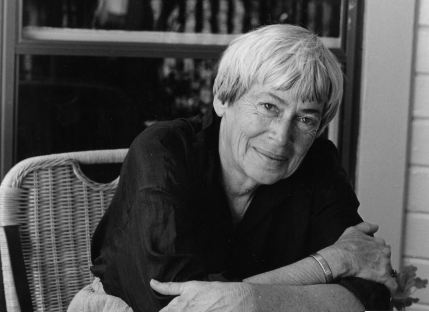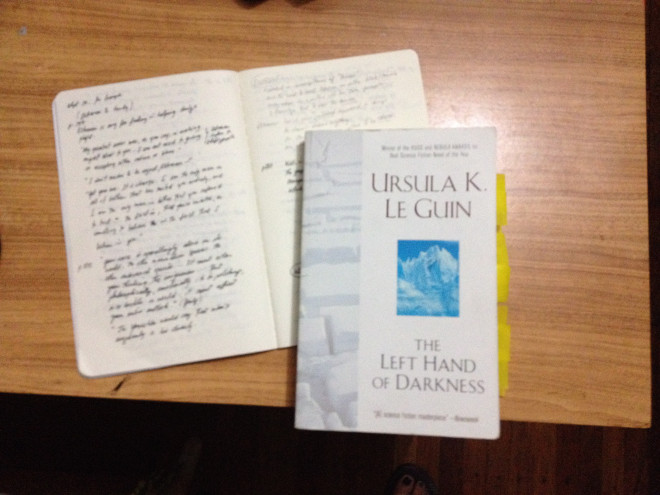 Iphigene here.
Iphigene here.
Le Guin made me rethink sci-fi. My encounters of Le Guin’s writing have been too few and far in between. I encountered her short story Those Who Walk from the Omelas in high school. I read her Earthsea Series in college. Not being a big fan of fantasy and sci-fi, Le Guin and I would never meet again until my early 30s. A reading challenge forced me to read some Sci-Fi. I asked my friend Sam (a sci-fi reader) and was told that “you can never go wrong with Le Guin.” I settled on a wild goose chase for her book, The Left Hand Of Darkness. I found the single copy available, read it and was blown away.
The number of flags I put on this novel and the notes I took would tell you that I was profoundly, utterly, incredibly dumbfounded by my first science fiction novel. It was not what I expected it to be. Science Fiction has always been one of my least favorite genres for the simple reason that I could not care for alien characters, alien civilizations or even a very futuristic world, maybe it was the jargon or maybe it was something else. But LeGuin changed that for me.
I have read The Left Hand of Darkness a few years back, but was never really able to talk about it. So, as my own little tribute to Ursula Le Guin, allow me to share bits and pieces of this beautiful book.
The Left Hand of Darkness is a book that demands its reader to ruminate about the issues presented and at the same time think about the real world and the issues we face today. I would not have thought this book was written in 1969 because it remains relevant and its thesis important to this day.
There are quite a number of things I could talk about in this novel. The initial drafts I made tackled communication, ambisexuality, duality, fear and love, but I found myself re-organizing my thoughts and re-conceptualizing the review. I will leave you to discover those topics on your own when you read the novel. Today, I’ll talk about trust, by which I mean being able to lean on uncertainty.
“The unknown…the unforetold, the unproven, that is what life is based on. Ignorance is the ground of thought. Unproof is the ground of action. If is were proven that there is no God there would be no religion. No Handdara, no Yomesh, no Hearth gods, nothing. But also if it were proven that there is a God, there would be no religion…tell me, Genry, what is known? What is sure, predictable, inevitable–the one certain thing you know concerning your future, and mine?”
“That we shall die?”
“Yes. There is only one question that can be answered, Genry, and we already know the answer…the only that makes life possible is permanent, intolerable uncertainty: not knowing what comes next.”
The novel, I felt reiterated this idea of uncertainty whether it was in this conversation between Faxe of the Handdara and Genly Ai or when Estraven upon meeting Genly again outside Karhide says “The unexpected is what makes life possible.”

This uncertainty component is not evident at first, but in closer examination it is everywhere in the novel. I even dare argue that it is at the heart of everything in the novel. The trip to Karhide was filled with uncertainty despite early surveys of the nation, Genly went there uncertain of the outcome. To further uncertainty, Genly had to face the idea of dealing with ambisexual people, where his notion of masculinity and femininity is challenged. Putting his faith on the support of Estraven was also uncertain. Crossing the great ice was also an uncertainty Genly and Estraven had to face. Even up to the very last minute, we are uncertain of the futures of the characters and the mission they set out to fulfill.
This overarching uncertainty influences the actions and behaviors of every character. It is expressed in fear, distrust and scheming. It is the elephant in the room that furthers or hinders progress. This uncertainty was translated into so many things, may it be fear or distrust. The Karhide King himself feared what Genly brought with him.
“But I do fear you, Envoy, I fear those who sent you. I fear liars, and I fear tricksters, and worst I fear the bitter truth. And so I rule my country well because only fear rules men. Nothing else works. Nothing else long enough.”
Despite evidence based on the examination of the King’s scientists to prove that Genly was from outer space, the King was uncertain of the truth. And the King refused to join the intergalactic organization Genly represented.
This frustration grew as the novel progresses. This failure led to distrust on the part of Genly towards Estraven. There was a growing animosity between them. Genly thought that he had logical reasons to be angry at Estraven but we catch glimpses of what truly bothered him. “I saw at last I was missing another signal. Damming effeminate deviousness”
As the earlier missions wrote in their notes about Winter/Karhide:
“A man wants his virility regarded, a woman wants her femininity appreciated, however indirect and subtle the indications of regard and appreciation. On Winter they will not exist. One is respected and judged only as a human being.”
This was a struggle Genly had to overcome. He could not read Estraven because he was uncertain of whether he was male and female. Without the certainty of Gender, Genly struggled with communicating and understanding Estraven, hence his distrust.
Further into the novel, this distrust is called on by Estraven in one of their stops as they cross the great ice.
“My greatest error was, as you say, in making myself clear to you. I am not used to giving or accepting either advice or blame…yet you are [unjust]. It is strange. I am the only man in all of Gethen that has trusted you entirely, and I am the only man in Gethen that you refused to trust…the fact is, that you’re unable, or unwilling to believe in the fact that I believe you.”
Only when he saw Estraven as human did he become comfortable in the uncertainty of his gender.
Often, we trust something because we understand it, by understand we mean we know the facts, something fits into our paradigm or stereotype – or that something is observable. But Trust is different from knowing. Understanding is different from knowing. Trust requires a leap of faith and faith is believing in the uncertain. Estraven, having grown up in the the religious community, the Handdara, is comfortable with uncertainty. He does not look at greater things such as politics and society. His trust on Genly was personal, he just believed him. And it was this trust that propelled him to believe what Genly brought forth as Envoy.
Estraven was, in many ways, the anti-thesis of Genly. Estraven was raised in the shadows, where darkness and light mingle. Comfortable in the uncertain, he trusted his gut and acted with confidence, trusted his hunch/ intuition. He didn’t consider certainty much, he did what he could, calculated some, but often acted with a level of faith, leaping into something and hoping things were right.
The difference, maybe, in the attitude towards uncertainty, lies in this:
“Well, in the Handdara…they are less aware of the gap between men and beasts, being more occupied with the likenesses, the link, the whole which living this are a part.”
There is acceptance of the difference, but that is not the focus, it is the likeness, the wholeness that Estraven sees and that is why despite uncertainty he leans easily into things because he does not see the difference, but the likeness. It is this thought that renders me speechless at the end of the book. I might not have delved much into it, if anything, the depth of the author’s understanding of what works in the world is profound.
Life is uncertain. And this uncertainty challenges our possibility and the seemingly impossible. It begs us to ask, “what if we tried this?” We think life is about data and facts, but even data and facts come from a level of uncertainty.
What this book describes is a way of viewing the world and life. We find comfort in science and what is known; yet majority if not all of life is uncertain. With every certainty lies a shadow of uncertainty. The ideas presented in the novel aren’t new, but maybe less talked about. Some parts remind me of Eastern religions such as Buddhism and Taoism. Some parts remind me of the sameness in what it is like to be human. At most, it challenges us to re-think our own beliefs and to lean on uncertainty.
I end this review with this poem Estraven quotes from the Handdara, which I think encapsulates the paradox of life and how we choose to view it.
Light is the left hand of darkness,
And darkness the right hand of light.
Two are one, life and death lying,
Together like lovers in kemmer,
Like hands joined together,
Like the end and the way.
If there is any doubt left to whether or not I like this book, let me say it: I loved it. It’s a classic. If there is one science fiction book I wish non-sci-fi readers would read, it would be this.
Thank you, Ursula Le Guin for opening my eyes and challenging my beliefs, what would we be, if not for writers like you.



I have actually never read any Le Guin, but I still found this to be a lovely and fitting tribute.
LikeLiked by 1 person
Thank you. The Left Hand of Darkness was simply mind blowing and i think even more since it was written in 1969.
LikeLike
oh wow, that is mindblowing. I added it to my TBR. 😀
LikeLiked by 1 person